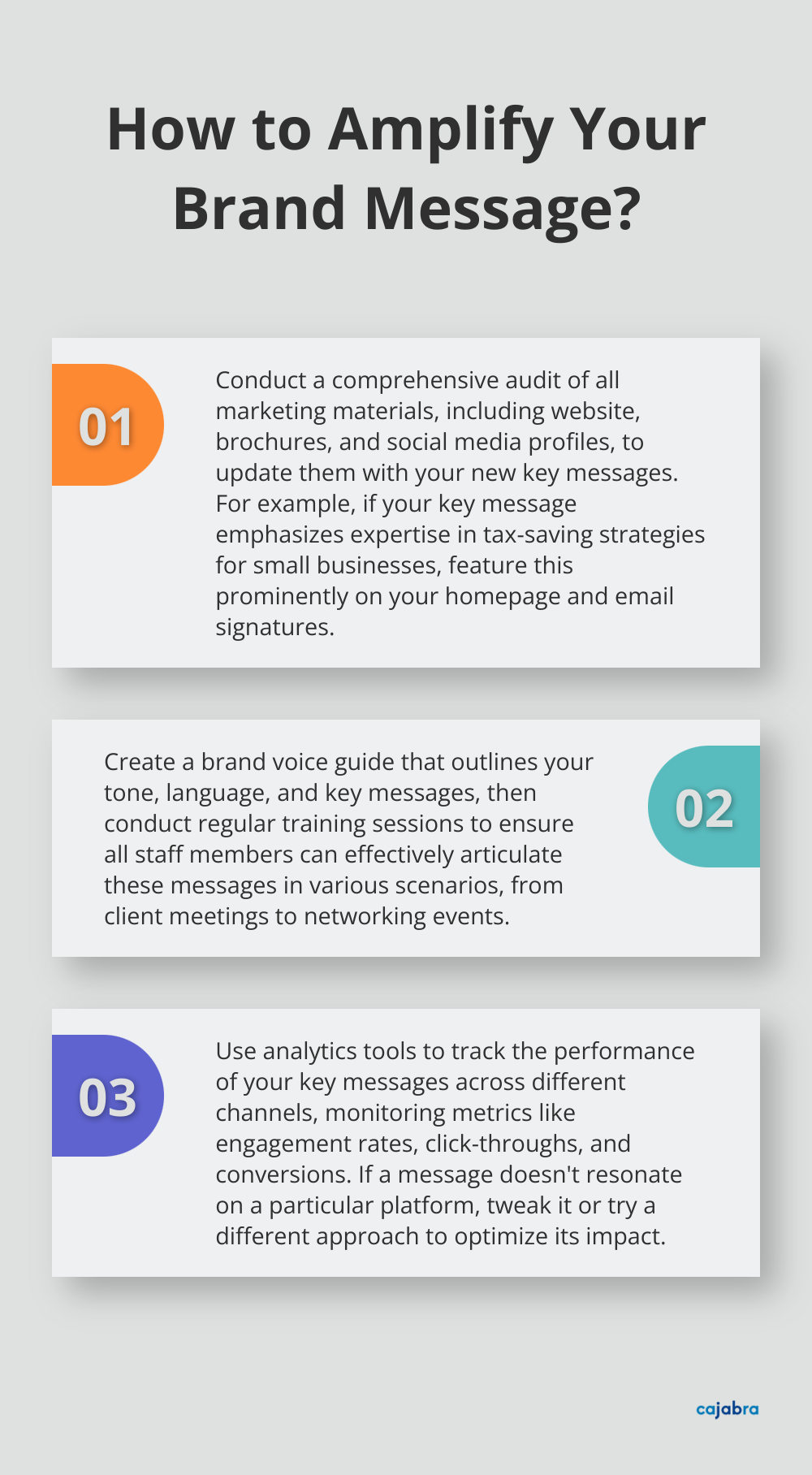
At Cajabra, LLC, we know that a strong key messaging strategy is the backbone of effective brand communication.
Your brand's voice is more than just words; it's the essence of your company's identity and values.
In this post, we'll guide you through the process of crafting compelling key messages that resonate with your audience and set your brand apart.
Key messaging forms the core of your brand's communication strategy. It's a set of carefully crafted statements that convey your brand's value, purpose, and unique selling points to your target audience. These messages act as the foundation for all your marketing efforts, ensuring consistency across various channels (from your website to social media posts and client presentations).
A study by Lucidpress revealed that consistent branding can increase revenue by up to 33%. This statistic underscores the significant impact that cohesive messaging can have on your bottom line. When your key messages align across all touchpoints, you create a unified brand experience that resonates with your audience and builds trust.
Your key messages play a pivotal role in shaping how your audience perceives your brand. They help differentiate you from competitors and position your firm as the go-to expert in your field. For instance, a clear, compelling message that communicates a unique value proposition (such as moving accountants from overlooked to overbooked in just 90 days) immediately sets a firm apart in the minds of potential clients.
Effective key messaging extends beyond external communication. It serves as a guide for your team, ensuring everyone aligns on how to talk about your firm's services and values. This internal alignment proves essential for delivering a consistent brand experience. Gallup's research has shown that companies with engaged workforces have higher earnings per share.
Key messaging requires regular review and refinement to stay relevant in a changing market. As you develop your key messages, consider how they reflect your firm's core values, address your clients' pain points, and differentiate you in the industry. The most effective messages are clear, concise, and resonate deeply with your target audience.

Now that we've established what key messaging is and why it matters, let's explore how to develop powerful key messages that will set your brand apart.
The first step in developing impactful key messages is to understand your target audience. Conduct thorough market research to identify your ideal clients' demographics, pain points, and aspirations. For accounting firms, this might involve surveying existing clients, analyzing industry trends, and studying competitor messaging.
A recent study found that 72% of customers will share a positive experience with 6 or more people. This underscores the importance of tailoring your messages to address specific client needs and preferences.
Your key messages should directly reflect your brand's values and mission. Start by revisiting your company's mission statement and core values. For instance, if your accounting firm values transparency and innovation, your key messages should emphasize these qualities.
Clarity is key when you craft your messages. Avoid industry jargon and complex terms that might confuse your audience. Instead, focus on simple, powerful statements that clearly communicate your value proposition.

For example, instead of saying "We provide comprehensive financial solutions," you could say "We help small businesses save time and money on taxes." The latter is more specific and addresses a direct benefit to the client.
Once you draft your key messages, it's important to test them with your target audience. This can be done through focus groups, surveys, or A/B testing in your marketing campaigns.
A report revealed that leaders who say service and marketing are highly aligned are 69% more likely to say that their customer service strategy was effective in 2023. Testing and refining your messages based on audience feedback ensures they truly resonate with your target market.
Developing key messages is an ongoing process. As your business evolves and market conditions change, your messaging should adapt accordingly. Try to review and update your key messages regularly (at least annually) to ensure they remain relevant and effective in driving your brand's success.
Now that you've learned how to craft powerful key messages, let's explore how to implement these messages across various channels to maximize their impact. Creating a brand voice guide that outlines your tone, language, and key messages can help ensure consistency across all team members involved in customer communication.
Start with an audit of all your existing marketing materials. This includes your website, brochures, social media profiles, and email templates. Update these materials to reflect your new key messages consistently. For example, if one of your key messages emphasizes your firm's expertise in tax-saving strategies for small businesses, feature this message prominently on your homepage and in your email signatures.
Your staff are your brand ambassadors. Conduct regular training sessions to ensure everyone understands and can articulate your key messages effectively. Create a messaging strategy that includes your key messages, along with examples of how to use them in different scenarios (from client meetings to networking events).

A report by Gallup states that companies with engaged workforces have higher earnings per share (EPS) and seem to have recovered from the recession more quickly. Aligning your team with your key messages not only improves communication but also boosts overall performance.
While your core messages should remain consistent, adapt how you deliver them to different platforms. On LinkedIn, share detailed insights that showcase your expertise. On Instagram, use visual infographics to convey the same message more effectively. On Twitter, use concise, punchy statements.
Implementing key messages requires ongoing attention. Use analytics tools to track how your messages perform across different channels. Monitor metrics like engagement rates, click-throughs, and conversions. If a message doesn't resonate on a particular platform, tweak it or try a different approach.
Maintain consistency in your key messages across all channels. This consistency builds trust and recognition with your audience. Try to create a unified brand experience, whether a potential client encounters your firm on social media, your website, or through a personal interaction with a team member.
To effectively implement your key messages, plan your marketing communication strategies. Define your target market, position your products, and develop a clear plan for disseminating your messages across various channels.
Key messaging strategy forms the foundation of effective brand communication. It shapes audience perception, drives consistency across touchpoints, and impacts your bottom line. Clear, compelling messages that resonate with your target audience will set your accounting firm apart in a crowded market.

A well-executed messaging strategy offers numerous benefits (including team alignment and client trust). It helps you adapt to changing market conditions while staying true to your core values. Your key messages require regular review and adjustment to maintain their effectiveness.
At Cajabra, we help accounting firms develop powerful messaging strategies that move them from overlooked to overbooked. Our JAB System™ secures retainer-based clients and positions your firm as an industry leader. Take the first step towards transforming your brand communication today.



